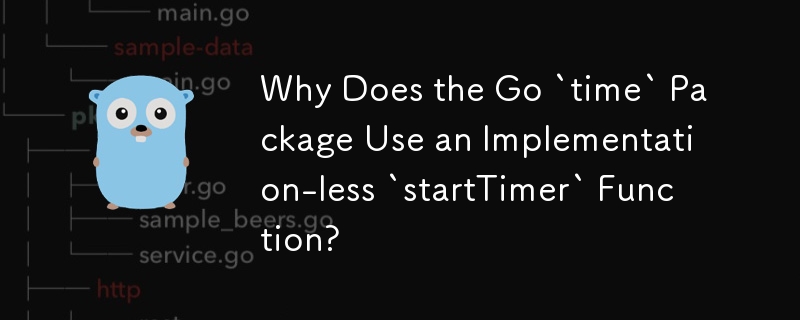為什麼 Go `time` 套件使用無實作的 `startTimer` 函數?
- DDD原創
- 2024-12-18 17:21:10205瀏覽

沒有函數體的函數呼叫
當瀏覽「time」套件的程式碼來檢查函數After(d Duration)
func After(d Duration) <-chan Time {
return NewTimer(d).C
}
func NewTimer(d Duration) *Timer {
c := make(chan Time, 1)
t := &Timer{
C: c,
r: runtimeTimer{
when: nano() + int64(d),
f: sendTime,
arg: c,
},
}
startTimer(&t.r)
return t
}
startTimer函數似乎沒有實現自己的:
func startTimer(*runtimeTimer)
問題:
- startTimer的實際程式碼在哪裡?
- 為什麼會有一個「抽象方法」 ?
- Go 開發者這樣做有什麼原因設計?
答案:
-
實際程式碼位置:
實際程式碼位置://go:linkname startTimer time.startTimer // startTimer adds t to the timer heap. func startTimer(t *timer) { if raceenabled { racerelease(unsafe.Pointer(t)) } addtimer(t) } - startTimer的程式碼在下面的組譯程式中定義:
Go 中的抽象方法:
-
Go 中,函數宣告可以省略函數體。這些聲明僅指定在 Go 外部實作的函數的簽名,例如B. 作為彙編例程。
設計原因:
以上是為什麼 Go `time` 套件使用無實作的 `startTimer` 函數?的詳細內容。更多資訊請關注PHP中文網其他相關文章!
陳述:
本文內容由網友自願投稿,版權歸原作者所有。本站不承擔相應的法律責任。如發現涉嫌抄襲或侵權的內容,請聯絡admin@php.cn

